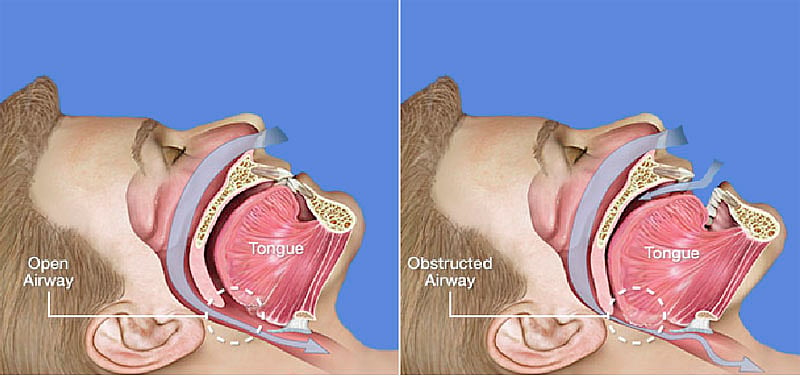Everyone knows that regular exercise and a good diet are the most important things you can do for a healthy life. As it turns out, though, a person's quality of sleep is also critical for overall well-being. Undiagnosed sleep apnea is directly tied to a decreased quality of life and an increased cardiovascular and metabolic health risk.
Sleep apnea is a sleeping disorder that can lead to serious health problems, such as high blood pressure and heart trouble. If untreated, sleep apnea causes breathing to stop repeatedly during sleep, causing loud snoring and daytime tiredness, even with a whole night's sleep. Sleep apnea can affect anyone, although most of its audience are older men who are overweight. Sleep apnea occurs in about 3% of average-weight individuals but affects over 20% Obese people. Sleep apnea affects men more than women, although sleep apnea rates drastically increase in women after menopause.
The signs
There are two kinds of sleep apnea: Obstructive Sleep Apnea and Central Sleep Apnea. Obstructive Sleep Apnea (OSA) happens when air can't flow into or out of the nose or mouth, although you're trying to breathe. Central Sleep Apnea (CSA) occurs when the brain fails to send the right signals to your muscles to make you start breathing. The latter form is less common.
Snoring can be a sign of sleep apnea but is not a norm for this disorder. Snoring is just the vibration sound created by airway resistance. You can snore loudly and not have sleep apnea, and you may even have sleep apnea without much snoring. Further, people suffering from sleep apnea may also complain about unexplained fatigue and mood swings because their breathing interruptions continually wake them up, preventing them from settling into deep, nourishing REM sleep.
The symptoms
The first signs of Obstructive Sleep Apnea (OSA) are often recognized not by the patient but by their partner. Many of those affected have no sleep complaints. The most common signs and symptoms of OSA include:
Snoring
Daytime sleepiness or fatigue
Restlessness during sleep, frequent nighttime awakenings
Sudden awakenings with a sensation of gasping or choking
Dry mouth or sore throat upon awakening
Cognitive impairment, such as trouble concentrating, forgetfulness or irritability
Mood disturbances, including Anxiety and Depression
Frequent nighttime urination
Sexual dysfunction
Frequent headaches
People with Central Sleep Apnea often report recurrent awakenings or Insomnia, although they may also experience a choking or gasping sensation upon awakening. Some common symptoms in children include poor performance at school, sluggishness during the day, breathing from the mouth, difficulty swallowing, unusual sleeping positions, bed-wetting, excessive sweating at night and learning and behavioral disorders.

Treatment options
In mild cases of Obstructive Sleep Apnea (OSA), conservative therapy can be the solution. If the person is obese, losing weight is an effective solution as weight loss can reduce the number of apneic events for most patients. However, losing weight can be challenging with untreated Obstructive Sleep Apnea due to increased appetite and metabolism changes it causes. Further, individuals with Obstructive Sleep Apnea should avoid using alcohol and certain sleeping pills as it can affect their airways and lead to collapse and prolonged apneic periods. Patients with sinus problems or nasal congestion should use nasal sprays or breathing strips to reduce snoring; this will ultimately improve airflow for more comfortable nighttime breathing. It is essential that everyone, even those who have sleep apnea, try to get the required hours of sleep as deprivation can have a detrimental effect.
Another treatment method for OSA is Positive Airway Pressure therapy. With PAP Therapy, patients wear a mask over their nose and mouth. An air blower gently forces air through the nose and mouth. The air pressure is adjusted so that it is just enough to prevent the upper airway tissues from collapsing during sleep. There are several styles and types of Positive Airway Pressure devices depending on the specific needs of patients.
Lastly, surgical procedures may help people with Obstructive Sleep Apnea and others who snore but don't have sleep apnea. Surgery is for people with excessive or malformed tissue obstructing airflow through the nose or throat, such as a deviated nasal septum, markedly enlarged tonsils, or a small lower jaw with an overbite that causes the throat to be abnormally narrow. These procedures are typically performed after their sleep apnea has failed to respond to conservative measures and CPAP trials. If left untreated, sleep apnea can result in several health problems, including hypertension, stroke, arrhythmias, cardiomyopathy (enlargement of the heart's muscle tissue), heart failure and attacks, diabetes and obesity.
Why one should not ignore sleep apnea?
The likelihood of sleep apnea causing arrhythmias and Heart Failure is ever-present as patients suffering from the disorder tend to have higher blood pressure. If you or your partner has noticed signs of sleep apnea, we highly recommend visiting your doctor at the earliest. Patients must visit a sleep laboratory to spend the night for monitoring and diagnosis. You'll rest easier knowing the results, so please head to a specialist if you or your family show any signs of sleep apnea.
(Dr Prashant Chhajed is Director, Pulmonology and Sleep Centre, Fortis Hiranandani Hospital, Vashi, and Dr Anshu Punjabi is Consultant Pulmonologist and Sleep Medicine Expert, Fortis Hospital, Mulund)








